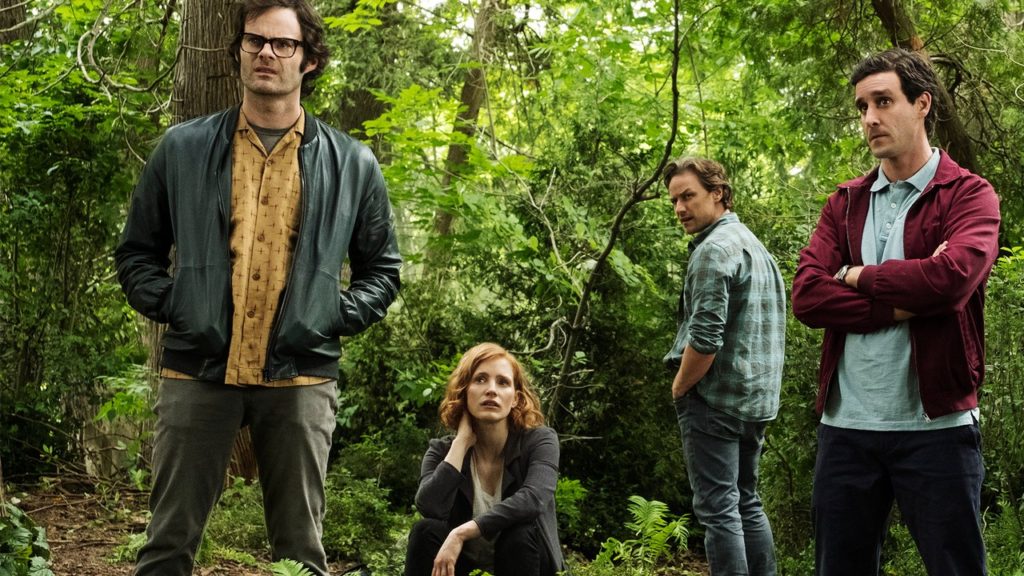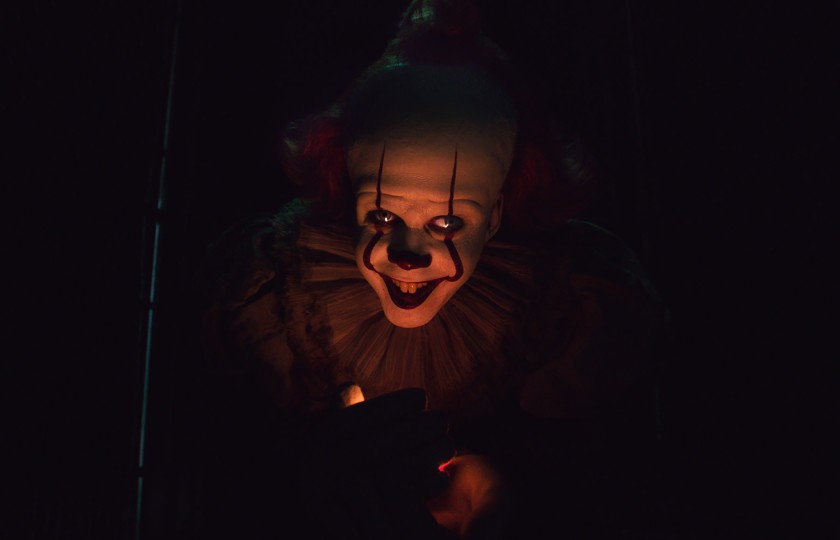It: Chapter Two (2019)

DIRECTOR: Andy Muschietti
CAST: James McAvoy, Jessica Chastain, Bill Hader, Jay Ryan, James Ransone, Isaiah Mustafa, Andy Bean, Jaeden Martell, Sophia Lillis, Finn Wolfhard, Jack Dylan Grazer, Jeremy Ray Taylor, Wyatt Oleff, Chosen Jacobs, Nicholas Hamilton, Teach Grant, Bill Skarsgard
REVIEW:
IT: Chapter Two, the film adaptation of the “27 years later” adult section of Stephen King’s novel, hasn’t saved the best for last. The conclusion to 2017’s IT is far from the worst film adaptation of a King written work, but it’s bloated, overstuffed, and unwieldy, clocking in at a formidable—and unnecessarily drawn-out—-three hours, a full thirty-five minutes longer than Chapter One. That’s a lot of meandering runtime. To be sure, there’s a number of strong scenes in the mix, but it requires a bit of sifting through uneven material.
As viewers of the first film—or readers of the book—will know, the gang of plucky kids who dubbed themselves “The Losers”, made up of Bill Denbrough (Jaeden Lieberher), Beverly Marsh (Sophia Lillis), Richie Tozier (Finn Wolfhard), Eddie Kaspbrak (Jack Dylan Grazer), Ben Hanscom (Jeremy Ray Taylor), Stanley Uris (Wyatt Oleff), and Mike Hanlon (Chosen Jacobs) made a blood pact following their seeming defeat of It/Pennywise (Bill Skarsgard) that in the event of It’s return, they would as well. Twenty-seven years later, and Mike (Isaiah Mustafa), the only one who has lived the intervening decades in their childhood town of Derry, Maine, starts picking up ominously familiar things on police scanners about dismembered bodies and missing children. To this end, he summons the rest of The Losers, but they are scattered to the four winds, lost their memories of their childhood when moving beyond Derry’s borders, and are reluctant to return. Bill (James McAvoy) is now a successful author with film adaptations of his books, but struggles to come up with satisfactory endings (was Stephen King making a self-deprecating in-joke here?). Beverly (Jessica Chastain) has swapped an abusive father for an abusive husband. Richie (Bill Hader) is a stand-up comedian. Eddie (James Ransone) is a risk analyst, and still a henpecked hypochondriac who fell into the pitfall of marrying his mother (an in-joke on the movie’s part; the two roles are played by the same actress). The years have been a little more generous to Ben (Jay Ryan), who’s lost the weight and become a successful architect. All are traumatized when that dreaded phone call comes from Derry, Maine, summoning them back to face their childhood demons, none more so than Stanley (Andy Bean), but one by one, The Losers trickle back home and reassemble. This time, Mike has a plan to defeat Pennywise once and for all: a Native American tribal ritual which requires all of them standing together to have a chance of working.
The flaws of Chapter One—a meandering, overly dragged-out pace—are magnified here by the excessive runtime. Chapter Two is overlong, self-indulgent, and meandering, and could have benefitted from a tighter cut with some scenes excised. The tone whiplashes between horror and black comedy in a way that’s occasionally awkward (never more so than when a gruesome moment is interrupted briefly by “Angel of the Morning” in a touch that feels ripped from Deadpool of all things and is jarringly out-of-place here). In Chapter One, the cast was made up entirely of little-known faces. Here, there’s three prominent exceptions—James McAvoy, Jessica Chastain, and Bill Hader—but despite having the lion’s share of screentime here, we don’t connect as much to the adult versions of The Losers. The filmmakers themselves seem to recognize how important the ensemble cast of child actors was to Chapter One, as they incorporate numerous flashback sequences here, and it’s telling that most of the most effective and affecting moments involve the kids. Maybe it’s an inevitable by-product of being brought back together after twenty-seven years apart and barely remembering each other (Pennywise’s supernatural influence, which begins to fade the more time they spend together), but the adults feel like strangers; we don’t feel the camaraderie among them like we did with the kids in Chapter One, and that’s part of the reason why we feel less connected to them.

The horror element is also weaker here. Pennywise is never scarier than in two scenes, one in which he lures a little girl underneath the football bleachers by playing on her insecurity (the most opportunity Bill Skarsgard gets to actually act), and a carnival funhouse scene in which adult Bill tries desperately—and futilely—to save a young boy (the latter scene does not exist in Stephen King’s novel, and was thought up by director Andy Muschietti and star James McAvoy). Alas, with the exception of those two moments, even Pennywise himself isn’t as scary or freakish this time around; he comes off more fatuous than nightmarish, and seems more interested in playing “boo!” with The Losers than actually getting down to business. There’s some unsettlingly freaky imagery—especially in the Chinese restaurant scene, and the decapitated head sprouting spider legs—but other horror moments that are over-the-top to the point of being unintentionally comical. And there’s something slightly distastefully gratuitous about an opening brutal hate crime perpetrated on a gay man (Xavier Dolan) who gets finished off by Pennywise, like a superfluous scene with no greater bearing on the narrative (Dolan’s character never interacts with The Losers or is ever mentioned again) shoehorned in to make a little social commentary (in fairness to the filmmakers, this scene is straight off the page of Stephen King, who based it on a real hate crime in his hometown).
Speaking of faithfulness to King’s written word, IT Chapter Two is faithful in basics if not in specifics. Side characters like Bill’s wife Aubrey and Beverly’s abusive husband Tom have one scene apiece and are never seen again, but their characters are disposable anyway. More problematic is the half-baked way the movie handles Pennywise’s minion of sorts Henry Bowers. In Chapter One, Bowers (played by Nicholas Hamilton) was a secondary villain, but here the adult Bowers (Teach Grant) is a one-note giggling lunatic who feels extraneous, like a plot point that should have been either expanded on or left out; he only pops up against The Losers twice and is easily disposed of. Likewise, the creepy adults who added to the unsettling atmosphere in Chapter One are abandoned here; Derry itself is never a “character” the way it was in the book, and in fact apart from Xavier Dolan’s hate crime victim and the unfortunate couple of children, it barely seems populated. The absence of Maturin the Turtle will rankle some viewers, but the Ritual of Chud might be brought to the screen about as faithfully as can be expected (a book has a lot more room to elaborate on this kind of thing than a movie, and some things that work on the page might look goofy onscreen). The visualization of Pennywise’s final form is a little silly, but maybe not as bad as it could have been. Like many a story trying to come up with a way to defeat a seemingly all-powerful supernatural entity, the resolution here feels a little underwhelming and deus ex machina, although it could be seen as making a statement about the underlying weakness of bullies. And just as Chapter One had commentary to make about the power of friendship, so too does Chapter Two have something to say about nostalgia and facing up to unresolved childhood trauma (a recurring theme in King’s works), and the way these themes wrap themselves up in the epilogue might produce some wet eyes in the theater, with a denouement and a couple ending revelations that are poignant enough to make up for the underwhelming way that Pennywise himself is defeated.
The adult actors were obviously cast with an eye toward credibly passing themselves off physically as grown-up versions of the child actors, though there’s arguably the least resemblance between the the child and adult versions of their “leader”, Jaeden Martell (formerly known as Jaeden Lieberher) and James McAvoy. Despite being the most prominent “names” in the cast, McAvoy and Jessica Chastain don’t eclipse their younger counterparts Martell and Sophia Lillis; in fact, Bill and Beverly are more memorable in the younger actors’ hands, but that could be partly because their younger selves felt better-developed. On the other hand, Bill Hader is arguably the scene-stealer among the adult Losers, always ready to drop some snappy, often acerbic one-liners but also showing a haunted core (though the ultimate revelation or at least strong implication that Richie is SPOILER WARNING a closeted homosexual harboring a more-than-platonic love for Eddie could have been better-developed and made more clear for a fuller poignant impact in the climax). James Ransone not only looks like an older version of Jack Dylan Grazer, but also does a good job emulating Grazer’s frazzled mannerisms and rapid-fire speaking style. Mike, who felt the most underdeveloped in Chapter One, does not escape the same fate again, and feels like little more than a plot device to bring everyone back together and hatch the battle plan. There’s cameos by director Peter Bogdanovich (as himself) and none other than Stephen King as a surly storeowner (is it coincidence that Bill Hader as Richie vaguely resembles King?).
In horror, it’s easier to build up a story than to end one, and IT Chapter Two lives up to this maxim. The three hours feature several memorable moments and a tear-jerkingly poignant epilogue, but it takes a lot of meandering through uneven material to get there. Ultimately, it brings things to a closed full circle in adequately satisfying fashion, but Chapter Two is rarely as strong as Chapter One.
* * 1/2